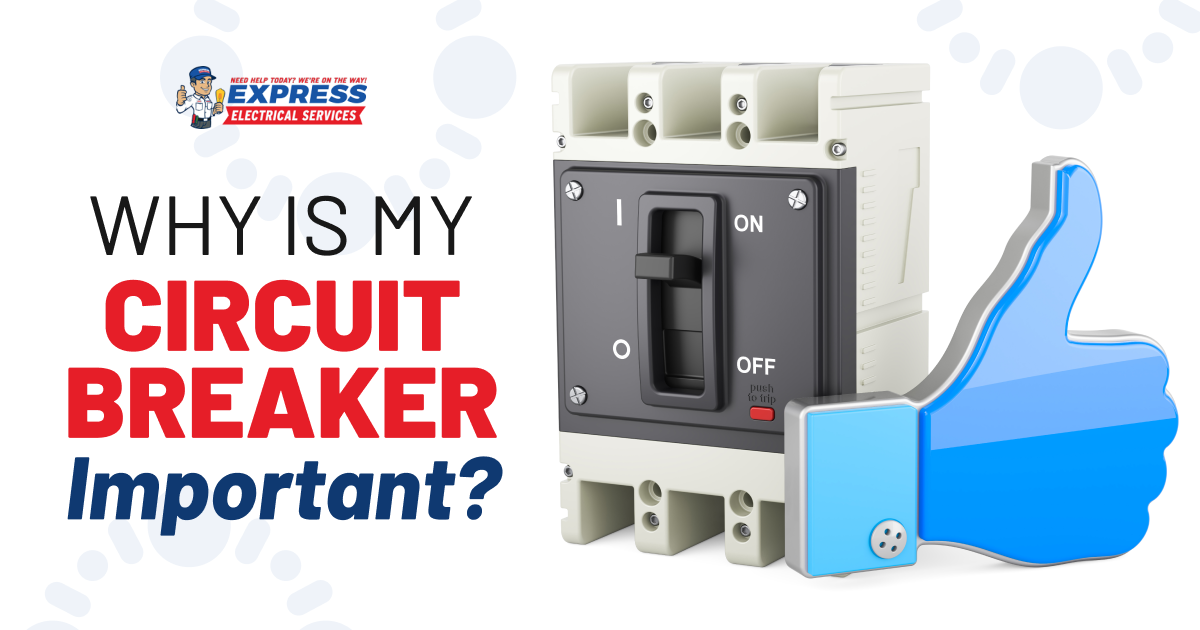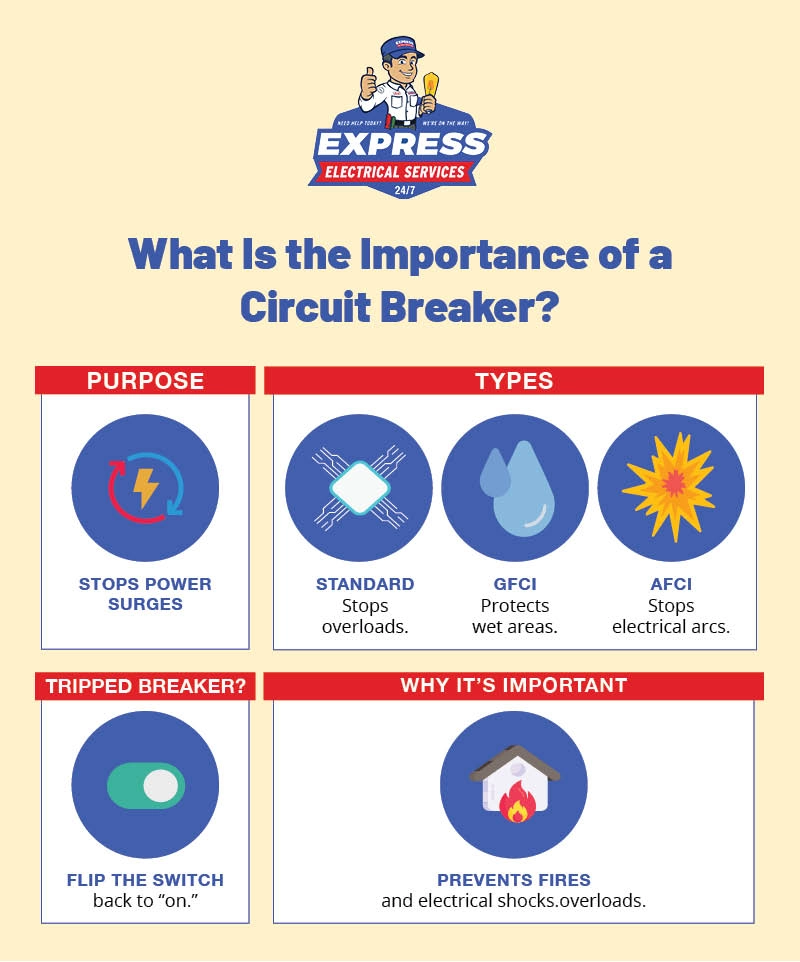What Is the Importance of a Circuit Breaker?

Homeowners, renters, and landlords should understand the importance of circuit breakers and what they do. First, you need to understand how electricity flows through your house, where it comes from, and what a circuit breaker does.
Read on to learn what a circuit breaker is, the different types of circuit breakers available, and why they’re important.
What Is a Circuit Breaker?
A circuit breaker is a mechanical switch in your home’s electrical system. It’s there to cut off power if the current gets too high. It’s a safety mechanism to protect your electrical circuit from damage in case of overload, high current, ground fault surge, or short circuit in the system. In short, its function is to stop the current flow when it detects any fault or overload.
Power is delivered to your home from a distribution grid through a service wire leading into the circuit. If the circuit carries more current than it can handle — for example, if you run all appliances at once — this may cause an electrical overload.
Before circuit breakers were invented, homes used fuses, which would blow when too much power overloaded the system, requiring replacement. Today, the choice between circuit breaker vs. fuse is clear. Circuit breaker panels include multiple breakers that reset with the flip of a switch rather than requiring replacement. The switch flips when the system overloads and the power is cut off from that specific circuit.
Why Circuit Breakers Are Important for Your Home

If you’re wondering, “Why do I need a circuit breaker?” you’re in the right place. Circuit breaker importance can’t be overstated. They’re the mechanism that stands between your home and an electrical disaster.
Without a circuit breaker, your home would be at risk of shorted-out wiring, appliances, and anything else plugged in. This could lead to expensive replacement costs and electrical shocks, burns, or fires.
Different Types of Circuit Breakers
There are three common, most used types of circuit breakers: standard circuit breakers, ground fault circuit interrupters, and arc fault circuit interrupters.
Standard circuit breakers
A standard circuit breaker can detect an electricity overload or short circuit. It interrupts the current to prevent overheating, fires, and destruction of appliances.
Ground Fault Circuit Interrupters (GFCIs)
GFCIs cut power to the entire circuit when they detect a current overload, short circuit, or line-to-ground fault. They’re required anywhere there might be moisture in the home, like bathrooms, kitchens, garages, basements, laundry rooms, and crawl spaces.
Arc Fault Circuit Interrupters (AFCIs)
AFCIs protect against arcs, or unintentional electrical jumps or discharges from wiring or an electrical cord. These breakers are more attuned to quick surges of electricity than standard breakers. According to the National Electric Code Section 210.12 (A), they may be required in new homes.
How to Identify a Tripped Circuit Breaker
You’ll notice your circuit breaker has tripped when you hear a loud “click” sound and the power suddenly shuts off in all or part of the house. If this happens, open up your circuit breaker panel, which is usually located behind a closed metal door in the wall.
Look for breaker switches in the “off” position. In some panels, they’ll be bright orange, but in others, it may not be as obvious. Flip the switch back to the “on” position, and power should be restored.
Sometimes, the switch may be sitting between on and off. Before turning it back on, move it to the off position so it can properly reset. If the power doesn’t return or the breaker immediately trips again, you may need to call an electrician for help.
When to Call an Electrician
Your circuit breaker must remain in good working order for your home’s function and safety. If it’s not working properly or is damaged, consult with an electrician on the best way to proceed. Repairs or replacement may be necessary.
Some signs you should call an electrician include:
- The circuit breaker keeps tripping
- A strange smell or burning odor
- It feels hot to the touch
- Buzzing or humming noises
- Lights are flickering and blinking
- Light bulbs burn out quickly
- Damage, rust, or corrosion on the box
- The metal looks burned on the panel or other electrical components
- Loose breaker switch
- The breaker is getting old
- You want to upgrade your home’s electrical system
Circuit Breaker Safety Tips for Homeowners
The following are some circuit breaker safety tips for homeowners:
- Be careful when flipping switches, especially if you’re not sure they’re labeled correctly. You may accidentally damage delicate electronics in your home.
- If you see visible damage, smell burning plastic, hear strange sounds, or notice anything unusual about your electrical panel, call an electrician right away.
- Watch for signs like flickering lights or frequent circuit breaker overloads, as this could mean your system has outdated, unsafe wiring.
- Spread your devices and appliances across different circuits and outlets to avoid overloading one circuit.
- To ensure your electrical system is running properly, have it inspected by a professional about every 10 years (or every five years for rental properties).
Most importantly, if you feel unsafe, call a professional electrician. With their in-depth knowledge of electrical systems, they can help you get your electricity back on and identify a potential problem that needs to be addressed. Don’t try to fix or replace your circuit breaker yourself if you’re not sure what you’re doing.
Call Express Electrical
The licensed electricians at Express Electrical are available to provide electrical services to residents throughout our service areas, including Southern California and Los Angeles.
Contact us today to schedule an appointment or to discuss your options for electrical system repairs, upgrades, installations, or maintenance. Our experienced team can help you with everything from home renovations to electrical emergencies.
Frequently Asked Questions
How do circuit breakers protect my home and appliances?
Circuit breakers are designed to shut down electrical circuits within milliseconds of detecting a power overload, preventing dangerous electrical surges.
What happens when a circuit breaker is tripping?
When a circuit breaker trips, a mechanical switch quickly cuts power and stops the flow of electricity. This safety measure prevents power surges, damage, and electrical fires from occurring.
How does a circuit breaker work?
A circuit breaker is a switch or metal strip designed to detect too much electrical current flowing through a circuit. Once it reaches its intended threshold, it breaks the connection and stops the power flow.
